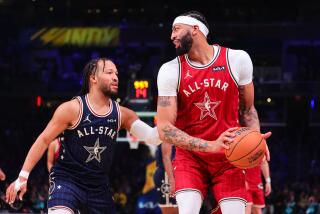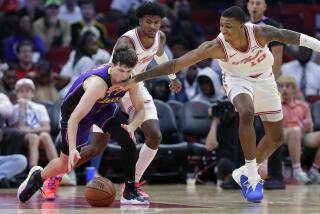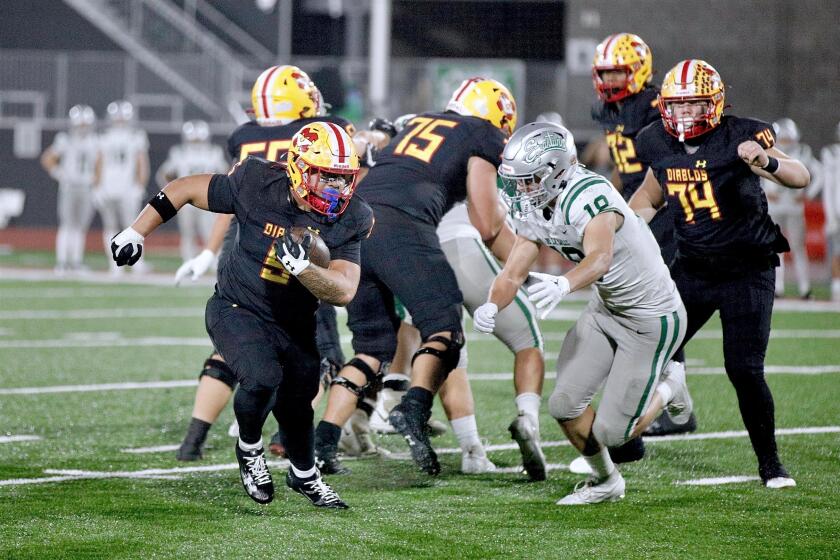NBA Should Pull the Plug on This Season
Just do it, NBA. Just do today what you’ll have to do in two weeks, anyway. Why wait? Don’t schedule a drop-dead date. Just drop dead. Now.
Cancel the season, quick, before another player insults the public’s intelligence with a silly comment, before new stubble appears on David Stern, before you hold another of those productive, 10-hour meetings where the two sides can agree only on where to send out for lunch.
Yank the season with the same speed that Dennis Rodman showed Carmen Electra.
You took the only logical step by killing the All-Star Game on Tuesday. Now, take it one further. There isn’t much reason to play an abbreviated season, which, for the first time in league history, wouldn’t span two years. Don’t try to condense 1998-99 into ’99. Drop it altogether.
Don’t worry. You won’t inconvenience too many people. Mostly, they will be the courtside celebrities who’ll miss out on precious air time. And Ahmad Rashad.
If the season began a month from now, after two weeks of trades and signings and two weeks of training camp, it would last about 45 games. What the season would gain in suspense, it would lose in quality. Teams such as the Phoenix Suns, with only three players under contract, would need time to blend as many as four new starters. Rookies would be worthless. The rust wouldn’t wear off most veterans until March. Scheduling would be a nightmare.
Plus, everyone knows how it’ll end, anyway. A fresh Michael Jordan returns. Bulls win.
There won’t be as much competition on the court as there has been in the negotiating sessions. Remember when the lockout used to be about owners and players dividing a fair share of a billion-dollar business? Now it’s more about winning and losing, period. It doesn’t sound like either side wants the embarrassment of being beaten by the other. You suspect it has evolved like the O.J. trial, where it stopped being about justice after two weeks. Then it was just attorneys trying to save face.
So what the NBA should do is cancel the season and spend the spring negotiating a labor contract that will satisfy everyone. They can take all the time they need, as long as the owners and players raise an issue that hasn’t been addressed. An issue that should top the agenda.
The labor fight is all about splitting the revenue, when it should be about guaranteed contracts. They’re the real scourge of the NBA. Guaranteed contracts are what anger the owners. They’ll sign a player to a long and lucrative contract based on potential, and often the player doesn’t live up to the dollars. The team is then stuck with his cap-killing contract for years.
The solution for the owners, therefore, is to give in to the players’ desire for 60% of revenues. In exchange, guarantee all contracts on a year-to-year basis only.
Everyone wins. The players can still sign for big money. The owners no longer have to live with their mistakes. A Jim McIlvaine can get a ridiculous $35-million deal, but if the Seattle SuperSonics aren’t satisfied with the four measly rebounds he grabs every night, they can release him and relieve themselves and their cap of the financial burden. Just like in the NFL.
Contracts that aren’t guaranteed can also help the game in another way. They would improve the quality of both the play and image of the league, two areas that could use it. Nonguaranteed contracts motivate players and force them to behave properly and train regularly. They weed out the Benoit Benjamins of the league. Without guaranteed contracts, players will no longer have the luxury of taking their sweet time to develop. They’ll have plenty of incentive to perfect their skills in the off-season and bring something new to camp.
The best recent examples of this are Rex Chapman and Walt Williams. Both were caught in a salary-cap squeeze when released by the Miami Heat and were forced to live on the $1-million exemption. With uncertain futures, they responded with career years and gave themselves leverage.
Without guaranteed contracts, the NBA could also slow the surge of underclassmen declaring for the draft. Players who still need time to learn how to play the game might decide to continue doing that in college, not on the sport’s highest level.
The only serious drawback of canceling the season? We might be subjected to more “premier” exhibitions like the one being proposed for Dec. 19 in Atlantic City, N.J. In what’s sure to be a bonanza, both artistically and financially, the game will contain no defense, there’ll be no risk and nothing at stake. No Jordan, either.
Sounds like a noon pickup game at Basketball City in Manhattan.
In another one of their public-relations mistakes, the players said the game will be partly for charity, and also to help those players making the minimum salary. They’re said to be hurting.
Yep, it’s hard to keep a budget on a lousy $275,000.
If the poorer players are existing on bread, then why, since solidarity is the union buzzword, doesn’t Alonzo Mourning or Juwan Howard or another member of the lucrative $100-million contract club give a loan? Why ask a fed-up public for help?
Once again, the players don’t get it. Maybe they never will. The owners are getting millions from NBC and TNT during the lockout. They won’t budge. And since the players insist on standing firm, then there’s only one thing left to do:
Take a year off. You both deserve it. So do we.
More to Read
Go beyond the scoreboard
Get the latest on L.A.'s teams in the daily Sports Report newsletter.
You may occasionally receive promotional content from the Los Angeles Times.










